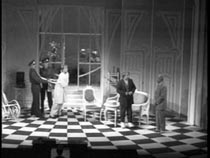
|
|
 |

Eduardo De Filippo
notes on his theatre
1. Theatre in dialect during Fascism, was considered a second rate one. Did not receive any funding. It was very popular (Eduardo's company was a big hit in 1931 and in the following years), but had limited possibility to travel. He is with Pirandello the most popular Italian Playwright of the century, his plays are performed all over the world.
 Eduardo
is the heir of a long tradition of theatre in Naples. He combines the
tradition of the commedia dell'arte (masks and improvisation) , with
the farce and melodrama theatre. His father was an actor and a playwright
(adapter of French farces, inventor of a lower middle class 'mask' called
Felice Sciosciammocca). Tradition elabotares gags, comic situations,
characters on the base of patters that only slightly change. (example:
one who tries to read a letter not knowing hopw to read it). That tradition
provided also stories that variously adapted could be used for different
proposes, or be carrier of different meanings. Eduardo stood on stage
when he was four, with his older sister (Titina) and hid younger brother,
Peppino. They all worked for the stepbrother Vincenzo, who inherited
the family company. De Filippo is still a great family of actors. Tradition
for Eduardo is critical: he sees himself as a perpetuator of a way of
doing theatre, but at the same time as a reformer. It can be said that
he transformed the dialect local farce to a national, tragicomic theatre.
Eduardo
is the heir of a long tradition of theatre in Naples. He combines the
tradition of the commedia dell'arte (masks and improvisation) , with
the farce and melodrama theatre. His father was an actor and a playwright
(adapter of French farces, inventor of a lower middle class 'mask' called
Felice Sciosciammocca). Tradition elabotares gags, comic situations,
characters on the base of patters that only slightly change. (example:
one who tries to read a letter not knowing hopw to read it). That tradition
provided also stories that variously adapted could be used for different
proposes, or be carrier of different meanings. Eduardo stood on stage
when he was four, with his older sister (Titina) and hid younger brother,
Peppino. They all worked for the stepbrother Vincenzo, who inherited
the family company. De Filippo is still a great family of actors. Tradition
for Eduardo is critical: he sees himself as a perpetuator of a way of
doing theatre, but at the same time as a reformer. It can be said that
he transformed the dialect local farce to a national, tragicomic theatre.
 Eduardo
uses a farce frame for a tragic theme. He switches continuously from
comedy to drama, makes audience laugh and cry. He's an equilibrist, mixing
styles.
Eduardo
uses a farce frame for a tragic theme. He switches continuously from
comedy to drama, makes audience laugh and cry. He's an equilibrist, mixing
styles.
Eduardo was an actor, a playwright, a company manager, a director. Those professions enriched his perspective of 'doing theatre' but in some way imposed to him some choices: As a company manager he has been hesitant in many ways to give up the farce (so welcomed by the audience) to write dramatic plays. As a playwright in charge of a company he wrote for a specific group of actors (some of them were first class). This meant he could imagine immediately the possible result, or he could take advantage of the help of his partners during rehearsals. On the other hand this meant also that very few are the leading female roles in his plays, as his sister left the company during the early fifties. He had an'idea of 'directing a play' which merged with writing. Directing was part of his writing. And writing came from his directing. There is no distance between the director's and the author's perspective. The stage directions are not suggestions from the author, but the transcriptions of what happened on stage. His dramaturgy has been called 'a posteriori '. As an actor worked of polishing his interpretation, get them rid of that exaggerated acting that was very common at the time.



